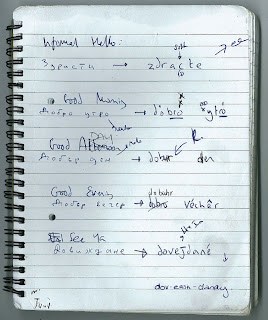 |
| Learning Bulgarian with Boris |
When you are emigrating to a country where English is not widely spoken then the language is one of the first things that you will start to think about. Being able to communicate with your neighbours is vital and will mean that you can integrate much quicker. It is also really helpful if you can make yourself understood when in bars, restaurants or shops.
 |
| The Bulgarian Alphabet |
But what is life without a challenge, hey.
As in many parts of this whole process I was lucky in that around the time that I decided to move to Bulgaria, I was in a position to influence the hiring in of a Bulgarian developer to the company I worked at. Boris since then has proven his weight in gold (it is he who has been my main nagging weapon with the architect has he has willingly phoned her a few times, and also he who rang the Kmet about the house in the woods) and he has been teaching me Bulgarian.
 |
| The first words |
Our strategy was to pick up words which would be useful, and not worry too much about language structure and grammar at this stage. We spent all week working out what words to add for the next week and then took Boris out for dinner over which we proved what had learned the previous week, while adding new words for the next.
I really struggle with languages and found that I was only able to really pick up one or two new words a day, and sometimes not even that. Many times J managed to learn every word for the week in the first day, and then spent the rest of the time patiently trying to hammer those same words into my thick skull.
This process has slowed down since I changed jobs and don't see Boris every day, and pretty much stalled completely as things finished between me and J. In the last few days I've started taking the notepad into work and getting colleagues to assist me in breaks at work. Scottish Mike takes particular pleasure in requesting that I repeat the words with the correct angry accent (which is amusing as I've always found the language sounds soft and lyrical when locals talk).
There have been any number of examples of how useful it has been to know even the few words that have stuck; the pleasure of being able to say "studeno" (cold) when given a warm beer, and then have the warm beer removed and one with ice on it passed over is amazing. We were also able to walk into a village and communicate with a villager that we were looking for the house ("kushte") for sale ("prodava li se") and it was a flash of amazing inspiration when I understood as he said "ahhh eto tam" which means "over there" and follow him.
This blog is plenty long enough now so I will leave it here. I will do another blog covering specifically software and books which I have found useful, bought, or had recommended to me.
When I learned Arabic and Thai I found it really useful to get a child's picture book showing all sorts of everyday scenes - school, hospital, street scenes, home, etc and write in my own phonetic versions of the names. I think the link between picture and word really helped to develop a working vocabulary.
ReplyDeleteAnd if you know a lot of nouns, you only need a few verbs and greetings to start to make headway. Immersion will have you speaking like a native in no time... but possibly not a native of Bulgaria! :o)
Haha that is a great idea :) seeing as I bought a school I have managed to pull out quite a few educational items when I was tidying, including a picture dictionary. As I get a little more confident with the letters I will be using it I think.
DeleteIt's so much harder with the different alphabet, though I suppose that is the same for Arabic and Thai.
Yeah, a native of planet fuckwit :D
Immersion is key to learning a language. One thing I found useful when I was living abroad was lot watching English language TV but the local channels for news and current affairs, mainly I'd just have it on in the background. You might be able to stream Bulgarian TV over the internet?
ReplyDeleteThat's a really good point, thanks for making it :) a mutual friend has said that what they are doing is watching bulgarian youtube videos and things like that. I really should get round to doing that :)
DeleteThanks
обучение bugarian е много прилича прави любов с красива жена. Трябва да разберете, шумовете, знаят кога да приключи езика си около тях и винаги се погребват в трудните части.
ReplyDeleteHAHAHAHA
DeleteThat is the Russian alphabet you've put on the picture.
ReplyDeleteThere are a few differences and a few extra letters between the two.
Aaaaarghhh!!! bloody google image search :D
DeleteI will replace when I get home ;)